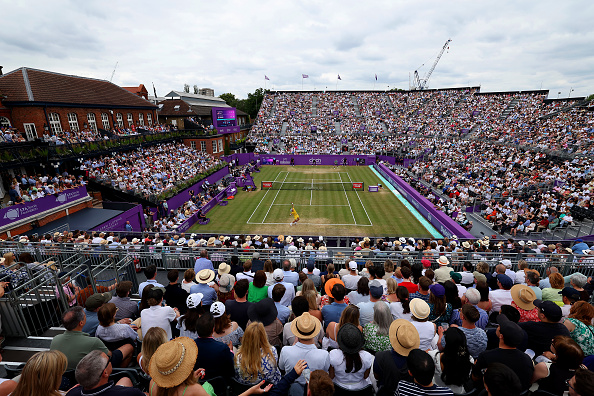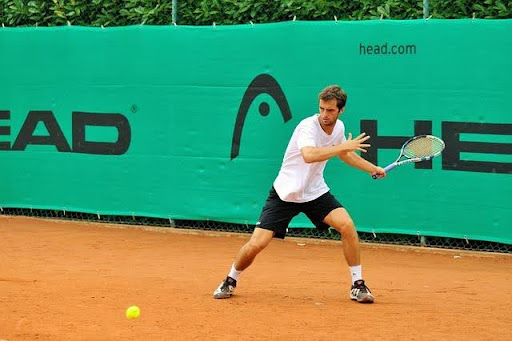[ad_1]
The scene seemed very familiar and almost timeless, as Tommy Paul beat Lorenzo Musetti in the singles final of the annual pre-Wimbledon tournament at The Queen’s Club, on a perfect grass court in front of the beautiful Victorian pavilion. But, in the background, the prospect of significant changes is growing.
The towering temporary stands around The Queen’s Club’s Centre Court were as always filled to their 10,000-seat capacity, but most of the spectators were there for the event and the occasion rather than to watch the 5th seed and number 13 in the ATP world rankings defeat the unseeded world number 30.
It is becoming ever harder for Queen’s to compete against the concurrent Halle tournament and the various exhibition matches being staged in the build-up to Wimbledon. The club’s location in London and its spectacular setting are two of its advantages in the increasingly-challenging battle to attract the best players.
That may soon be a matter for The Queen’s Club membership, because taking over the running of the event from the Lawn Tennis Association is one of the potential outcomes of the remarkable disputes escalating around the organisation of what used to be the London Grass Court Championships.
The conflict unexpectedly emerged from the very positive development of bringing back top-level women’s tennis to the venue next year. The Queen’s Club Championships were first held in 1890 as a joint men’s and women’s event, but the ladies’ competition was discontinued 51 years ago.
In a very fitting gesture, Olga Morozova, the last winner of the ladies’ singles title at The Queen’s Club in 1973, was present on the final day this year as a guest of honour, to celebrate the return of a WTA tournament to these courts in 2025 and to help grow awareness of this happening.

Olga Morozova in action during Wimbledon Championships,1968.
(Photo by Evening Standard/Hulton Archive/Getty Images)
However, the staging agreements, put in place between the WTA, the LTA and the host club, have been brought into question subsequently by some of The Queen’s Club members, for whom there could be very serious implications from negotiations with the governing bodies conducted on their behalf but in secret.
The Queen’s Club is a limited company with the shares owned by the membership. All notable decisions have to be approved therefore in shareholder meetings. This did not occur in relation to the new WTA event, while leaving the members potentially liable financially for any losses incurred by the staging.
Already two emergency general meetings have been called and taken place, during which the club membership voted unequivocally against its hierarchy – despite being offered huge unrelated incentives to desist from pursuing their actions, such as the waiving of court fees, a big cost for all playing members.
Now a third emergency general meeting has been scheduled during the second week of Wimbledon, when ordinary members, led by some very eminent legal figures, will seek to take back control of their club from the executives running it, including the organisation of its signature championships week.
At the heart of the arguments is the relationship between the club and the LTA, who took on the ownership of Queen’s after the second World War, at a time when the necessary repair and upkeep of the club was causing almost insurmountable difficulties. The documents related to that transaction have been one source of contention.
The paperwork was mysteriously lost and controversially unavailable when the LTA partially sold back The Queen’s Club to the membership in 2007 – on extremely unfavourable terms, accepting a large payment for a limited lease, while retaining the freehold to the grounds. Recently, the original documents have been apparently rediscovered.
One suggestion is that the lease will be extended if The Queen’s Club members accept the LTA’s plans for the tournaments, including the agreement with the WTA, which is seen as particularly important in that it brings back women’s tennis to London ahead of Wimbledon, with its stars possibly making up for the loss of top men’s players.
The terms of the club ownership and the staging of The Queen’s Club Championships are set to be decided in a couple of weeks, at a time when the nation is very much focused on the sport during the later stages of Wimbledon. And there did not sound like a lot of mood for compromise during conversations over the weekend.
It has been reported that the main objectors come from the more active portion of the membership, who regularly use the club’s facilities and are understood to number around 700, out of a total of about 4,000 members. The disruptive building work to set up the site for the tournament affects them most of all.
And from next summer they will have to forego the use of much of the club for a fortnight rather than just for 7 days, as the WTA competition is scheduled to precede the established ATP event in consecutive weeks. That also raises the question of how accepting the men will be of playing on courts already worn away by the women’s matches.

Queen’s Club in the Stella days
(Photo by Clive Brunskill/Getty Images)
Another complicating factor is the loss of the title sponsors of The Queen’s Club Championships, which will no longer be the cinch Championships after the 2024 edition. It has been a frustrating issue that there has been no sustained backer ever since the end of the long-standing Stella Artois Grass Court Championships in 2008.
Nevertheless, Queen’s should not be under the same immediate threat as the Surrey Grass Court Championships at the Surbiton Racket & Fitness Club, whose restricted space has led the LTA to seek to stop holding an event at that venue, with a new combined men’s and women’s tournament in Birmingham taking its place on the calendar next year.
Queen’s is still felt to provide the best option for staging high-profile men’s and women’s tennis in London outside of Wimbledon. Continuing some form of a Surrey-based competition could yet materialise, although alternatives to Surbiton have been looked at, such as Roehampton, where the National Tennis Centre is located.
It was the LTA’s transfer from Queen’s to the NTC 17 years ago that initially loosened the previously-strong links between the ruling body of British tennis and one of its foremost clubs. Now there may be a further parting of the ways in prospect, and again seemingly far from amicably.
The uncertainty about the future did not distract from the 2024 singles final, won by Paul over Musetti 6-1, 7-6 after taking the decisive 2nd set tie-break 10-8. It gave Paul his 1st ATP Tour grass court title, in what is believed to be the 121st staging of the championships. Exactly how the 122nd will look in a year’s time is so far still unknown.

Tommy Paul of United States with this year’s trophy
(Photo by Clive Brunskill/Getty Images)
[ad_2]



